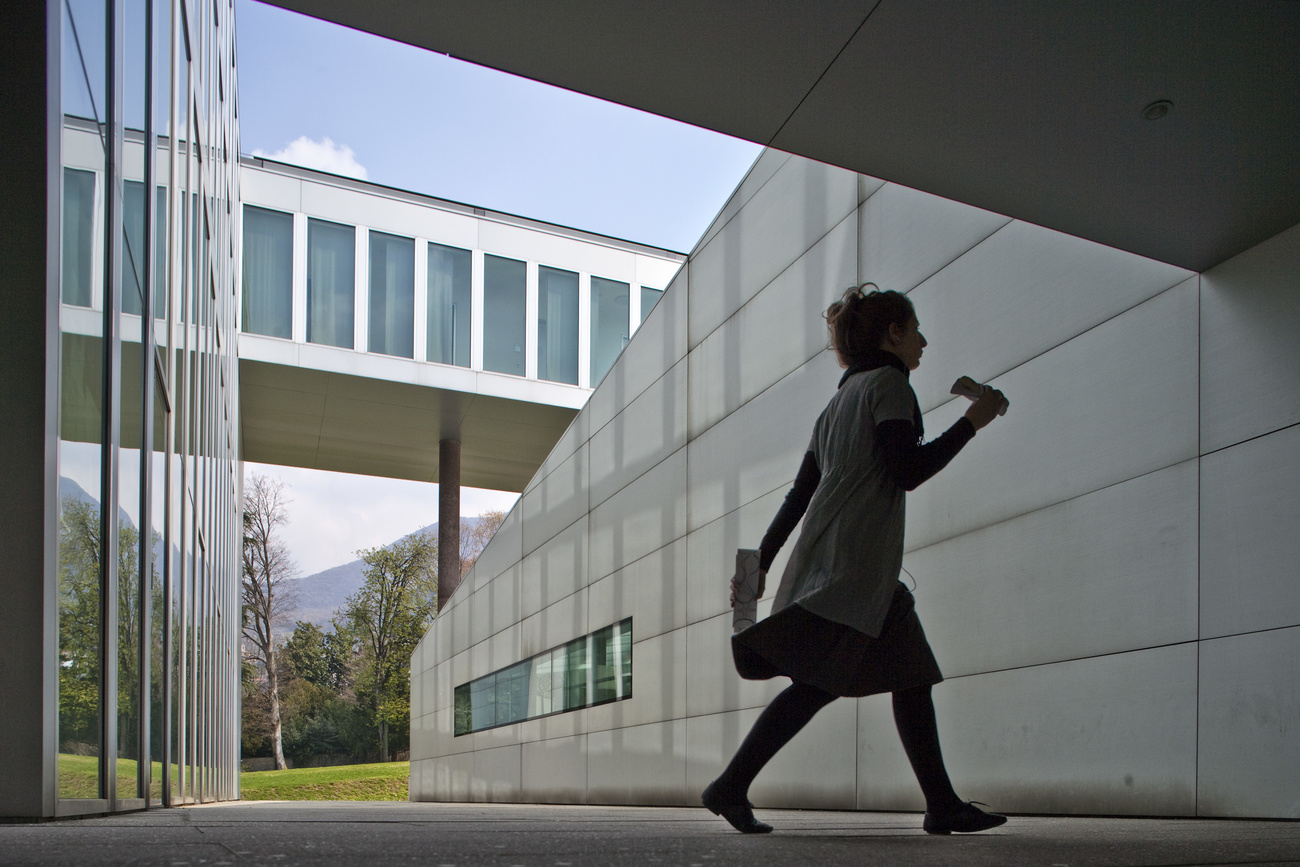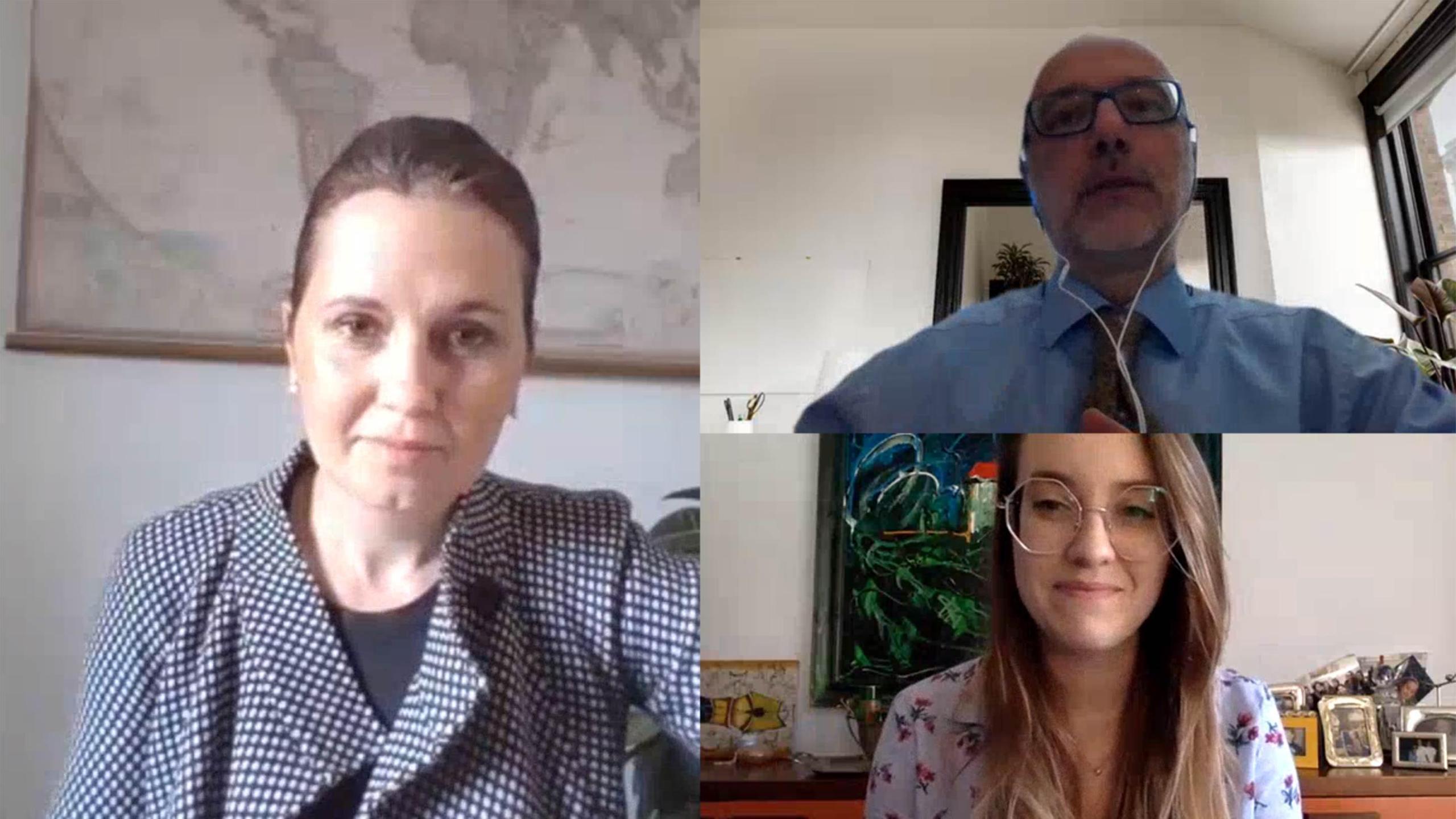
How one Swiss university in a hard-hit region coped with Covid-19

As coronavirus cases rapidly spread, southern Switzerland’s Università della Svizzera italiana (USI) found new ways of working and supporting those affected by the crisis. Now it is preparing for a slow re-opening.
“It has been a lot of work, and hasn’t been easy,” said Boas Erez, the USI’s rector, on adapting to the new situation imposed by the pandemic. But by pulling together, the university community stayed true to its mission through the emergency, he told swissinfo.ch.
It has been particularly difficult for the 1,455 Italian students and members of staff (a third of the faculty) whose country of origin has suffered a particularly devastating coronavirus outbreak. Many students returned home to their families as the situation became more serious, attending lectures from home. “Some have been affected directly by the consequences of the virus, and more than anything, our sympathy goes out to them,” Erez said.
Founded in 1996, the USI, the only Italian-language public university in Switzerland. It is spread across three campuses in Lugano, Mendrisio and Bellinzona.
It hasExternal link 2,971 students and 869 professors and researchers from over 100 countries. It is particularly known for its architecture department at Mendrisio.
The university was ranked among the top 350 institutions in the 2019 Times Higher Education rankings of universitiesExternal link receiving particular praise for its international outlook. Most of its Masters courses are in English.
Shutdown and return to normal
Switzerland ordered universities to stop on-site teaching from March 16, as part of measures to contain the coronavirus. Universities may now re-open for students from June 8, but most will continue with distance learning until the end of the spring semester. In many cases, summer exams will be taken online and graduations held virtually. This is also the case at the USI (it finished the semester on May 29, but there will be exams in June/July).
The USI introduced its coronavirus measures progressively, while constantly monitoring the situation in neighbouring Lombardy – sometimes acting before decisions taken at a Swiss national level, Erez said.
On March 8, for example, the university announced that it would limit access on two campuses for those coming from Covid-19 “red zones” in northern Italy (e-learning was offered instead). From March 12, the university closed down for teaching completely. Scientific research continued, like elsewhere, under special conditions.
The university’s total switch to online learning was aided by the fact that it has an eLab, which promotes e-learning among students and staff, Erez said. No course days were lost.
There were other changes: the Dies Academicus university celebration day, graduation ceremonies and even a tour for potential Masters students were held online for the first time.
Professors adapt to big changes
“My work was profoundly affected by the crisis,” said Lorenzo Cantoni, director of the Institute of Digital Technologies for Communication, and pro-rector for Education and Students’ Experience.
“Two courses taught jointly with colleagues changed from face-to-face to online, after several days of a mixed approach with some students on campus and others working remotely. While some content was ready, we had to produce a lot of new content, such as video lessons and online meetings with students,” he said.
Working from home was a particular challenge: “I often worked very early in the morning to record the video lessons, before my children got up, so I could record without any noise. During work hours, I then had to ‘compete’ for the internet connection with my wife and children, as we were all using the connection for work or studies.”
Keeping in contact with students, especially those having a tough time personally, has also been key. “It was very important to reassure them and help them not to lose faith and their enthusiasm for their studies,” Cantoni said via email.

The university also offered a solidarity scholarship fundExternal link to
those impacted by the pandemic.
+ Swiss student finances affected by coronavirus lockdown
Students miss their peers
For Yassin Ndiaye, a student taking a Bachelors in Italian language, literature and civilization, maintaining a balanced studying routine was one of the biggest challenges of the lockdown. It was not as easy to maintain her concentration and organisation as before, she said.
“Being at home for such a long time made me realise the importance of human contact and exchanging ideas, things you normally take for granted,” she said via email.
As her student year representative, Ndiaye found her herself in a key role as an intermediary between students and lecturers. Her class maintained solidarity during the coronavirus crisis, she said, with lecturers working hard to make distance lessons “as normal as possible”.
The future
With the coronavirus situation easing in Switzerland, thoughts are now turning to the future – some staff have already been allowed back on campus under special conditions and the USI is to announce its measures for the autumn semester on June 16 – and what might change for university life.
For rector Erez, e-learning is the most evident example, especially now that everyone at the school (not just a minority) has tried it. Working from home, online conferences and events and new digital formats were also other areas to explore.
PLACEHOLDERWhat might have been done better: a little more previous investment in digital content, he says.
Cantoni and Ndiaye are looking forward to getting back to campus one day. In research, it’s the informal contact like the chat at the coffee machine or the quick visit to your colleague’s office for an update that are important as well as the formal contact like meetings, Cantoni points out.
“I miss all of this, and I hope we can soon return to normality,” he said, “even if it is a slightly different one that guarantees social distancing and, if necessary, the possibility of going back online.”

In compliance with the JTI standards
More: SWI swissinfo.ch certified by the Journalism Trust Initiative



























You can find an overview of ongoing debates with our journalists here . Please join us!
If you want to start a conversation about a topic raised in this article or want to report factual errors, email us at english@swissinfo.ch.